Who's afraid of the euro crisis?
- Published
After two major bailouts and a change in government, Greece is still struggling to reduce its debt mountain. But how might the crisis in Greece spread out across Europe and what are the main fears for each economy?
Greece
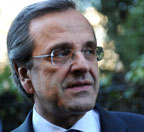
Prime Minister Antonis Samaras
Took office:
June 2012
June 2012
Big fear:
Running out of money
Running out of money
After a second parliamentary election in as many months, Greece's centre right New Democracy party has managed to cobble together a grand coalition with former arch opponents Pasok as well as the anti-austerity Democratic Left.
New Prime Minister Antonis Samaras' big fear is the government will either fall apart, or run out of money (or both) before Christmas, which could precipitate an exit from the euro.
The coalition parties make strange bedfellows, and have agreed to push for softer terms - including slower spending cuts - from Greece's bailout lenders.
If the Greeks fail to reach a deal with Germany and other lenders, or if they fail in the coming months to fulfil promised spending cuts and reforms in any renegotiated deal, then Greece's lenders could stop sending the bailout cheques, leaving the country's government and its banks bust.
New Prime Minister Antonis Samaras' big fear is the government will either fall apart, or run out of money (or both) before Christmas, which could precipitate an exit from the euro.
The coalition parties make strange bedfellows, and have agreed to push for softer terms - including slower spending cuts - from Greece's bailout lenders.
If the Greeks fail to reach a deal with Germany and other lenders, or if they fail in the coming months to fulfil promised spending cuts and reforms in any renegotiated deal, then Greece's lenders could stop sending the bailout cheques, leaving the country's government and its banks bust.
Portugal
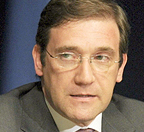
Prime Minister Pedro Passos Coelho
Took office:
21 June 2011
21 June 2011
Big fear:
Bank run
Bank run
Portugal's government and banking system are already living on European life support. Since being elected last year, Prime Minister Pedro Passos Coelho has been working hard to prove his commitment to cutting the government's overspending problem and regain the trust of markets.
But his work could be for nothing. Because if Greece leaves the euro, this could spark a panicky withdrawal of money from banks in weaker countries like Portugal - something that would test Europe's resolve to stop another member from falling out of the single currency.
But his work could be for nothing. Because if Greece leaves the euro, this could spark a panicky withdrawal of money from banks in weaker countries like Portugal - something that would test Europe's resolve to stop another member from falling out of the single currency.
Ireland

Taoiseach Enda Kenny
Took office:
9 March 2011
9 March 2011
Big fear:
Second bailout
Second bailout
Ireland has already had a major banking crisis following the collapse of the property market, and its government has already had to be bailed out. The economy recorded growth of 1.4% last year and appeared to be on the mend again, but the latest figures show it shrank by 1.1% in the first three months of 2012.
Its economy is highly dependent on euro area trade. And without growth, its shattered banking sector won't recover.
Taoiseach Enda Kenny's fear may be that the country has yet to hit rock bottom. He wants to renegotiate the terms of the bailout, to give it some breathing space.
Ireland has been unable to borrow on the markets since its bailout two years ago. And if the eurozone crisis makes it too expensive to resume borrowing, it may have to look to its euro neighbours for help again, maybe even in the form of a second bailout.
Its economy is highly dependent on euro area trade. And without growth, its shattered banking sector won't recover.
Taoiseach Enda Kenny's fear may be that the country has yet to hit rock bottom. He wants to renegotiate the terms of the bailout, to give it some breathing space.
Ireland has been unable to borrow on the markets since its bailout two years ago. And if the eurozone crisis makes it too expensive to resume borrowing, it may have to look to its euro neighbours for help again, maybe even in the form of a second bailout.
Spain
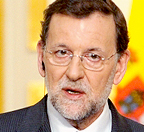
Prime Minister Mariano Rajoy
Took office:
21 December 2011
21 December 2011
Big fear:
Banking crisis
Banking crisis
Since coming to power in December, Prime Minister Mariano Rajoy's biggest headache has become the country's banks. They are facing huge losses on loans they made during a property bubble in the past decade.
So although Spain's government does not have debts as big as some, it has had to borrow and spend heavily as the economy slides deeper into recession.
It has had to go to the eurozone for loans to help its banks. But there are questions about whether it will be enough, and when the money will start flowing. What's more, critics say it doesn't do anything to make the country's finances any more solid.
So although Spain's government does not have debts as big as some, it has had to borrow and spend heavily as the economy slides deeper into recession.
It has had to go to the eurozone for loans to help its banks. But there are questions about whether it will be enough, and when the money will start flowing. What's more, critics say it doesn't do anything to make the country's finances any more solid.
Italy
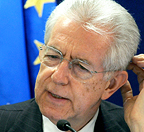
Prime Minister Mario Monti
Took office:
12 November 2011
12 November 2011
Big fear:
Collapse of market confidence
Collapse of market confidence
The new technocrat Prime Minister Mario Monti has two big fears. Firstly, although the government was relatively prudent with its finances after joining the euro, it is sitting on huge debts that were run up in the 70s and 80s.
An intensification of the eurozone crisis means markets turn their focus on Italy, deemed the next most vulnerable after the bailout countries. Investors then demand high rates of interest in return for lending Italy the money it needs to keep up with its debt repayments.
Secondly, Italy's economy is very weak, while its political system remains dominated by vested business interests opposed to Mr Monti's economic reforms.
If Mr Monti becomes unpopular with the public, then some politicians - notably former Prime Minister Silvio Berlusconi - may seek to topple his unelected government, potentially prompting political and financial turmoil.
An intensification of the eurozone crisis means markets turn their focus on Italy, deemed the next most vulnerable after the bailout countries. Investors then demand high rates of interest in return for lending Italy the money it needs to keep up with its debt repayments.
Secondly, Italy's economy is very weak, while its political system remains dominated by vested business interests opposed to Mr Monti's economic reforms.
If Mr Monti becomes unpopular with the public, then some politicians - notably former Prime Minister Silvio Berlusconi - may seek to topple his unelected government, potentially prompting political and financial turmoil.
France
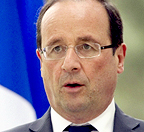
President Francois Hollande
Took office:
6 May 2012
6 May 2012
Big fear:
Foreign bank loans
Foreign bank loans
The newly elected President Francois Hollande has put a big emphasis on the need to stimulate economic growth, aligning him with the southern Europeans and putting him in potential conflict with Germany.
Although France's economy and the government's finances are in reasonably good shape, the country's Achilles Heel is its banks. The French banks have lent heavily to southern Europe, especially Spain and Italy. If either or both of those countries were unable to repay their debts, France's banks could go bust, and it is far from clear whether the French government could afford to rescue them.
Although France's economy and the government's finances are in reasonably good shape, the country's Achilles Heel is its banks. The French banks have lent heavily to southern Europe, especially Spain and Italy. If either or both of those countries were unable to repay their debts, France's banks could go bust, and it is far from clear whether the French government could afford to rescue them.
United Kingdom
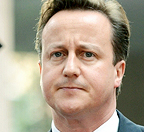
Prime Minister David Cameron
Took office:
11 May 2010
11 May 2010
Big fear:
Foreign bank loans
Foreign bank loans
Although not part of the eurozone, the UK would feel the effects if the single currency collapses. The euro area is its biggest trade partner, so a severe downturn would be terrible for British exporters.
There is also the threat of another major financial crisis.
The government still depends on London's financial services industry for a big chunk of its tax revenues. And UK-based banks could face huge losses on the loans they have made to their continental counterparts.
If the European financial system freezes up, banks will become more choosy about lending to UK consumers and businesses.
The Bank of England has been war-gaming a break-up of the eurozone with the big banks. But, as the 2008 crisis made clear, even the best-laid plans cannot predict how a major financial meltdown might play out.
There is also the threat of another major financial crisis.
The government still depends on London's financial services industry for a big chunk of its tax revenues. And UK-based banks could face huge losses on the loans they have made to their continental counterparts.
If the European financial system freezes up, banks will become more choosy about lending to UK consumers and businesses.
The Bank of England has been war-gaming a break-up of the eurozone with the big banks. But, as the 2008 crisis made clear, even the best-laid plans cannot predict how a major financial meltdown might play out.
European Central Bank
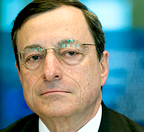
Mario Draghi
Took office:
1 November 2011
1 November 2011
Big fear:
Political pressure
Political pressure
Since taking over as the central bank's president last November, Mario Draghi has already provided a trillion euros in rescue loans, propping up banks and in effect easing government borrowing costs, particularly in Spain and in his home country Italy.
He has warned governments not to expect the ECB to do their jobs for them and has recently put the onus on them to get their finances in order. But if people start pulling their money out of the banks in Greece, Spain and other European countries, Mr Draghi probably stands ready to provide trillions more in rescue loans.
The risk for him is he is playing a game of double or quits. The more money the ECB lends, the bigger the losses if a country were eventually to leave the eurozone. And if the entire eurozone broke up, those losses would have to be shouldered by governments, and that would make it a huge political issue, especially in Germany.
The ECB, which has played a vital role in the crisis so far, stands and falls both on its independence from governments and the need for their total support.
He has warned governments not to expect the ECB to do their jobs for them and has recently put the onus on them to get their finances in order. But if people start pulling their money out of the banks in Greece, Spain and other European countries, Mr Draghi probably stands ready to provide trillions more in rescue loans.
The risk for him is he is playing a game of double or quits. The more money the ECB lends, the bigger the losses if a country were eventually to leave the eurozone. And if the entire eurozone broke up, those losses would have to be shouldered by governments, and that would make it a huge political issue, especially in Germany.
The ECB, which has played a vital role in the crisis so far, stands and falls both on its independence from governments and the need for their total support.
European Commission
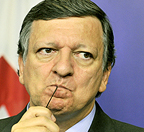
Jose Manuel Barroso
Took office:
22 November 2004
22 November 2004
Big fear:
Collapse of the EU
Collapse of the EU
The long-standing European Commission President Jose Manuel Barroso has a lot to win, and a lot to lose, from this crisis. He has been lobbying for a comprehensive solution that would give the commission a much bigger role in directing the eurozone's economic policies.
Last year he called for a "federalist moment" as he proposed common eurozone government debts to help weaker countries borrow at more favourable rates.
More recently, he has backed the creation of a banking union with a single regulator, a Europe-wide insurance scheme for savers' deposits and a single bank bailout fund.
His big fear is that if national governments do not hammer out an agreement on closer ties, the euro could fall apart acrimoniously, and that could torpedo the entire European project.
Last year he called for a "federalist moment" as he proposed common eurozone government debts to help weaker countries borrow at more favourable rates.
More recently, he has backed the creation of a banking union with a single regulator, a Europe-wide insurance scheme for savers' deposits and a single bank bailout fund.
His big fear is that if national governments do not hammer out an agreement on closer ties, the euro could fall apart acrimoniously, and that could torpedo the entire European project.
International Monetary Fund
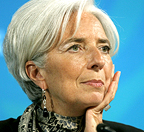
Christine Lagarde
Took office:
5 July 2011
5 July 2011
Big fear:
Global recession
Global recession
The IMF, along with the eurozone governments, has lent a lot of money to Greece and stands to lose if Greece cannot repay them.
But that is par for the course at the IMF, and is probably not something that its new managing director, Christine Lagarde, will be losing much sleep over. Instead, her big concern is that if the eurozone fails to hold itself together, it could spark a global financial crisis and recession similar to 2008-09.
Ms Lagarde has been calling for more leniency towards Greece and other borrowers, and more action in Europe to boost growth. She has also been lobbying the world's other big economies - including the US, China and Japan - to make more of their money available to support the Fund's continuing rescue efforts.
But that is par for the course at the IMF, and is probably not something that its new managing director, Christine Lagarde, will be losing much sleep over. Instead, her big concern is that if the eurozone fails to hold itself together, it could spark a global financial crisis and recession similar to 2008-09.
Ms Lagarde has been calling for more leniency towards Greece and other borrowers, and more action in Europe to boost growth. She has also been lobbying the world's other big economies - including the US, China and Japan - to make more of their money available to support the Fund's continuing rescue efforts.
Germany
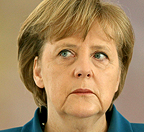
Chancellor Angela Merkel
Took office:
22 November 2005
22 November 2005
Big fear:
Euro break-up
Euro break-up
Chancellor Angela Merkel appears to be holding all the cards - she presides over Europe's strongest economy and strongest government finances.
Any rescue of the eurozone therefore ultimately relies on German money. If Chancellor Merkel provides the money too readily, she fears weaker countries will keep coming back for more, while her own voters may lose patience.
But if she does not provide the money, she risks letting the euro fall apart, in which case Germany will face a catastrophe - massive losses on loans already provided by the country's banks, government and central bank to southern Europe, a collapse in demand from Germany's biggest export markets, and an angry political backlash from the country's closest allies.
She is trying to use her power, and the reliance on her country's money, to force through greater integration of the eurozone, reasoning that this is the only way to keep the euro together in the long-term.
Any rescue of the eurozone therefore ultimately relies on German money. If Chancellor Merkel provides the money too readily, she fears weaker countries will keep coming back for more, while her own voters may lose patience.
But if she does not provide the money, she risks letting the euro fall apart, in which case Germany will face a catastrophe - massive losses on loans already provided by the country's banks, government and central bank to southern Europe, a collapse in demand from Germany's biggest export markets, and an angry political backlash from the country's closest allies.
She is trying to use her power, and the reliance on her country's money, to force through greater integration of the eurozone, reasoning that this is the only way to keep the euro together in the long-term.
- Global meltdown
- Euro break-up
- Banking meltdown
- Collapse in confidence
- Debt
crisis - Country
- Other
- Escalating crisis
Greece

Prime Minister Antonis Samaras
Took office:
June 2012
June 2012
Big fear:
Running out of money
Running out of money
After a second parliamentary election in as many months, Greece's centre right New Democracy party has managed to cobble together a grand coalition with former arch opponents Pasok as well as the anti-austerity Democratic Left.
New Prime Minister Antonis Samaras' big fear is the government will either fall apart, or run out of money (or both) before Christmas, which could precipitate an exit from the euro.
The coalition parties make strange bedfellows, and have agreed to push for softer terms - including slower spending cuts - from Greece's bailout lenders.
If the Greeks fail to reach a deal with Germany and other lenders, or if they fail in the coming months to fulfil promised spending cuts and reforms in any renegotiated deal, then Greece's lenders could stop sending the bailout cheques, leaving the country's government and its banks bust.
New Prime Minister Antonis Samaras' big fear is the government will either fall apart, or run out of money (or both) before Christmas, which could precipitate an exit from the euro.
The coalition parties make strange bedfellows, and have agreed to push for softer terms - including slower spending cuts - from Greece's bailout lenders.
If the Greeks fail to reach a deal with Germany and other lenders, or if they fail in the coming months to fulfil promised spending cuts and reforms in any renegotiated deal, then Greece's lenders could stop sending the bailout cheques, leaving the country's government and its banks bust.
Portugal

Prime Minister Pedro Passos Coelho
Took office:
21 June 2011
21 June 2011
Big fear:
Bank run
Bank run
Portugal's government and banking system are already living on European life support. Since being elected last year, Prime Minister Pedro Passos Coelho has been working hard to prove his commitment to cutting the government's overspending problem and regain the trust of markets.
But his work could be for nothing. Because if Greece leaves the euro, this could spark a panicky withdrawal of money from banks in weaker countries like Portugal - something that would test Europe's resolve to stop another member from falling out of the single currency.
But his work could be for nothing. Because if Greece leaves the euro, this could spark a panicky withdrawal of money from banks in weaker countries like Portugal - something that would test Europe's resolve to stop another member from falling out of the single currency.
Ireland

Taoiseach Enda Kenny
Took office:
9 March 2011
9 March 2011
Big fear:
Second bailout
Second bailout
Ireland has already had a major banking crisis following the collapse of the property market, and its government has already had to be bailed out. The economy recorded growth of 1.4% last year and appeared to be on the mend again, but the latest figures show it shrank by 1.1% in the first three months of 2012.
Its economy is highly dependent on euro area trade. And without growth, its shattered banking sector won't recover.
Taoiseach Enda Kenny's fear may be that the country has yet to hit rock bottom. He wants to renegotiate the terms of the bailout, to give it some breathing space.
Ireland has been unable to borrow on the markets since its bailout two years ago. And if the eurozone crisis makes it too expensive to resume borrowing, it may have to look to its euro neighbours for help again, maybe even in the form of a second bailout.
Its economy is highly dependent on euro area trade. And without growth, its shattered banking sector won't recover.
Taoiseach Enda Kenny's fear may be that the country has yet to hit rock bottom. He wants to renegotiate the terms of the bailout, to give it some breathing space.
Ireland has been unable to borrow on the markets since its bailout two years ago. And if the eurozone crisis makes it too expensive to resume borrowing, it may have to look to its euro neighbours for help again, maybe even in the form of a second bailout.
Spain

Prime Minister Mariano Rajoy
Took office:
21 December 2011
21 December 2011
Big fear:
Banking crisis
Banking crisis
Since coming to power in December, Prime Minister Mariano Rajoy's biggest headache has become the country's banks. They are facing huge losses on loans they made during a property bubble in the past decade.
So although Spain's government does not have debts as big as some, it has had to borrow and spend heavily as the economy slides deeper into recession.
It has had to go to the eurozone for loans to help its banks. But there are questions about whether it will be enough, and when the money will start flowing. What's more, critics say it doesn't do anything to make the country's finances any more solid.
So although Spain's government does not have debts as big as some, it has had to borrow and spend heavily as the economy slides deeper into recession.
It has had to go to the eurozone for loans to help its banks. But there are questions about whether it will be enough, and when the money will start flowing. What's more, critics say it doesn't do anything to make the country's finances any more solid.
Italy

Prime Minister Mario Monti
Took office:
12 November 2011
12 November 2011
Big fear:
Collapse of market confidence
Collapse of market confidence
The new technocrat Prime Minister Mario Monti has two big fears. Firstly, although the government was relatively prudent with its finances after joining the euro, it is sitting on huge debts that were run up in the 70s and 80s.
An intensification of the eurozone crisis means markets turn their focus on Italy, deemed the next most vulnerable after the bailout countries. Investors then demand high rates of interest in return for lending Italy the money it needs to keep up with its debt repayments.
Secondly, Italy's economy is very weak, while its political system remains dominated by vested business interests opposed to Mr Monti's economic reforms.
If Mr Monti becomes unpopular with the public, then some politicians - notably former Prime Minister Silvio Berlusconi - may seek to topple his unelected government, potentially prompting political and financial turmoil.
An intensification of the eurozone crisis means markets turn their focus on Italy, deemed the next most vulnerable after the bailout countries. Investors then demand high rates of interest in return for lending Italy the money it needs to keep up with its debt repayments.
Secondly, Italy's economy is very weak, while its political system remains dominated by vested business interests opposed to Mr Monti's economic reforms.
If Mr Monti becomes unpopular with the public, then some politicians - notably former Prime Minister Silvio Berlusconi - may seek to topple his unelected government, potentially prompting political and financial turmoil.
France

President Francois Hollande
Took office:
6 May 2012
6 May 2012
Big fear:
Foreign bank loans
Foreign bank loans
The newly elected President Francois Hollande has put a big emphasis on the need to stimulate economic growth, aligning him with the southern Europeans and putting him in potential conflict with Germany.
Although France's economy and the government's finances are in reasonably good shape, the country's Achilles Heel is its banks. The French banks have lent heavily to southern Europe, especially Spain and Italy. If either or both of those countries were unable to repay their debts, France's banks could go bust, and it is far from clear whether the French government could afford to rescue them.
Although France's economy and the government's finances are in reasonably good shape, the country's Achilles Heel is its banks. The French banks have lent heavily to southern Europe, especially Spain and Italy. If either or both of those countries were unable to repay their debts, France's banks could go bust, and it is far from clear whether the French government could afford to rescue them.
United Kingdom

Prime Minister David Cameron
Took office:
11 May 2010
11 May 2010
Big fear:
Foreign bank loans
Foreign bank loans
Although not part of the eurozone, the UK would feel the effects if the single currency collapses. The euro area is its biggest trade partner, so a severe downturn would be terrible for British exporters.
There is also the threat of another major financial crisis.
The government still depends on London's financial services industry for a big chunk of its tax revenues. And UK-based banks could face huge losses on the loans they have made to their continental counterparts.
If the European financial system freezes up, banks will become more choosy about lending to UK consumers and businesses.
The Bank of England has been war-gaming a break-up of the eurozone with the big banks. But, as the 2008 crisis made clear, even the best-laid plans cannot predict how a major financial meltdown might play out.
There is also the threat of another major financial crisis.
The government still depends on London's financial services industry for a big chunk of its tax revenues. And UK-based banks could face huge losses on the loans they have made to their continental counterparts.
If the European financial system freezes up, banks will become more choosy about lending to UK consumers and businesses.
The Bank of England has been war-gaming a break-up of the eurozone with the big banks. But, as the 2008 crisis made clear, even the best-laid plans cannot predict how a major financial meltdown might play out.
European Central Bank

Mario Draghi
Took office:
1 November 2011
1 November 2011
Big fear:
Political pressure
Political pressure
Since taking over as the central bank's president last November, Mario Draghi has already provided a trillion euros in rescue loans, propping up banks and in effect easing government borrowing costs, particularly in Spain and in his home country Italy.
He has warned governments not to expect the ECB to do their jobs for them and has recently put the onus on them to get their finances in order. But if people start pulling their money out of the banks in Greece, Spain and other European countries, Mr Draghi probably stands ready to provide trillions more in rescue loans.
The risk for him is he is playing a game of double or quits. The more money the ECB lends, the bigger the losses if a country were eventually to leave the eurozone. And if the entire eurozone broke up, those losses would have to be shouldered by governments, and that would make it a huge political issue, especially in Germany.
The ECB, which has played a vital role in the crisis so far, stands and falls both on its independence from governments and the need for their total support.
He has warned governments not to expect the ECB to do their jobs for them and has recently put the onus on them to get their finances in order. But if people start pulling their money out of the banks in Greece, Spain and other European countries, Mr Draghi probably stands ready to provide trillions more in rescue loans.
The risk for him is he is playing a game of double or quits. The more money the ECB lends, the bigger the losses if a country were eventually to leave the eurozone. And if the entire eurozone broke up, those losses would have to be shouldered by governments, and that would make it a huge political issue, especially in Germany.
The ECB, which has played a vital role in the crisis so far, stands and falls both on its independence from governments and the need for their total support.
European Commission

Jose Manuel Barroso
Took office:
22 November 2004
22 November 2004
Big fear:
Collapse of the EU
Collapse of the EU
The long-standing European Commission President Jose Manuel Barroso has a lot to win, and a lot to lose, from this crisis. He has been lobbying for a comprehensive solution that would give the commission a much bigger role in directing the eurozone's economic policies.
Last year he called for a "federalist moment" as he proposed common eurozone government debts to help weaker countries borrow at more favourable rates.
More recently, he has backed the creation of a banking union with a single regulator, a Europe-wide insurance scheme for savers' deposits and a single bank bailout fund.
His big fear is that if national governments do not hammer out an agreement on closer ties, the euro could fall apart acrimoniously, and that could torpedo the entire European project.
Last year he called for a "federalist moment" as he proposed common eurozone government debts to help weaker countries borrow at more favourable rates.
More recently, he has backed the creation of a banking union with a single regulator, a Europe-wide insurance scheme for savers' deposits and a single bank bailout fund.
His big fear is that if national governments do not hammer out an agreement on closer ties, the euro could fall apart acrimoniously, and that could torpedo the entire European project.
International Monetary Fund

Christine Lagarde
Took office:
5 July 2011
5 July 2011
Big fear:
Global recession
Global recession
The IMF, along with the eurozone governments, has lent a lot of money to Greece and stands to lose if Greece cannot repay them.
But that is par for the course at the IMF, and is probably not something that its new managing director, Christine Lagarde, will be losing much sleep over. Instead, her big concern is that if the eurozone fails to hold itself together, it could spark a global financial crisis and recession similar to 2008-09.
Ms Lagarde has been calling for more leniency towards Greece and other borrowers, and more action in Europe to boost growth. She has also been lobbying the world's other big economies - including the US, China and Japan - to make more of their money available to support the Fund's continuing rescue efforts.
But that is par for the course at the IMF, and is probably not something that its new managing director, Christine Lagarde, will be losing much sleep over. Instead, her big concern is that if the eurozone fails to hold itself together, it could spark a global financial crisis and recession similar to 2008-09.
Ms Lagarde has been calling for more leniency towards Greece and other borrowers, and more action in Europe to boost growth. She has also been lobbying the world's other big economies - including the US, China and Japan - to make more of their money available to support the Fund's continuing rescue efforts.
Germany

Chancellor Angela Merkel
Took office:
22 November 2005
22 November 2005
Big fear:
Euro break-up
Euro break-up
Chancellor Angela Merkel appears to be holding all the cards - she presides over Europe's strongest economy and strongest government finances.
Any rescue of the eurozone therefore ultimately relies on German money. If Chancellor Merkel provides the money too readily, she fears weaker countries will keep coming back for more, while her own voters may lose patience.
But if she does not provide the money, she risks letting the euro fall apart, in which case Germany will face a catastrophe - massive losses on loans already provided by the country's banks, government and central bank to southern Europe, a collapse in demand from Germany's biggest export markets, and an angry political backlash from the country's closest allies.
She is trying to use her power, and the reliance on her country's money, to force through greater integration of the eurozone, reasoning that this is the only way to keep the euro together in the long-term.
Any rescue of the eurozone therefore ultimately relies on German money. If Chancellor Merkel provides the money too readily, she fears weaker countries will keep coming back for more, while her own voters may lose patience.
But if she does not provide the money, she risks letting the euro fall apart, in which case Germany will face a catastrophe - massive losses on loans already provided by the country's banks, government and central bank to southern Europe, a collapse in demand from Germany's biggest export markets, and an angry political backlash from the country's closest allies.
She is trying to use her power, and the reliance on her country's money, to force through greater integration of the eurozone, reasoning that this is the only way to keep the euro together in the long-term.
The graphic shows the leaders whose decisions are considered most likely to shape the crisis in the coming months.